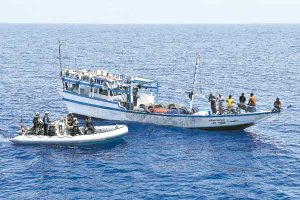HMCS Regina’s work explained
By Lookout on Feb 04, 2013 with Comments 0

Members of the Naval Boarding Party from HMCS Regina, deployed in their Ridged Hull Inflatable Boat, approach a fishing dhow.
The Gulf of Aden, situated between Yemen and Somalia, contains one of the world’s busiest shipping lanes. With an average of 21,000 ships transiting annually, it is part of the waterway that connects the Mediterranean Ocean with the Arabian Sea.
Determining which of these ships is engaged in legitimate commerce and which may have more detrimental intentions is one of the challenges faced by Combined Task Force 150 (CTF-150).
CTF-150 is part of the Combined Maritime Forces (CMF) and consists of ships from countries such as Australia, Canada, Pakistan, the United Kingdom and the United States. Tasked with counter-terrorism and maritime security operations, the task force works to prevent and stop illicit activity in the region.
HMCS Regina, Canada’s contribution to CTF-150, is currently conducting what is referred to as maritime interdiction operations. The aim of these patrols is to prevent illicit activity by observing and investigating the local shipping activity. By determining the normal trade routes and routines of the various types of vessels that pass through the region every day, CMF is better able to determine which activity is suspicious or illegal.
A typical patrol consists of recording and observing the behavior of the region’s merchant mariners. In order to gain the information about the vessels, the crew uses many tools available, such as the ship’s radar and Sea King helicopter. The Sea King’s primary function is to extend the range of the ship’s sensors by surveying the area of operations. A secondary function is to help determine if other vessels in the vicinity are behaving suspiciously.
In addition, local information can be gained by talking to mariners. This is accomplished by hailing the vessel and communicating over the radio. During a hail, Regina will contact the vessel and ask a series of questions. The answers will be compared to confirm the information provided is correct. Should additional information be required, the ship will send a boarding team to examine documents and question the crew in person.
Regina’s boarding party is trained to conduct two types of operations if they suspect suspicious activity: information operation approaches and full boardings. An approach operation establishes direct communication with a vessel to visually ascertain the crew and determine the material that can be seen on the upper decks. Full boardings are conducted on vessels to verify the crew, the cargo manifest and the ship’s holdings and documents.
Much like a police constable walking “the beat,” these operations are the front line component of maritime security operations.
An important part of being the front line component is increasing the visibility of CMF and allied forces. Visibility is fundamental to demonstrating to the people of the region that the international community is aware of the threats they face daily and is taking measures to ensure their safety as well as to show those conducting illicit activity that it will not be tolerated.
Through these patrols, Regina and her CTF-150 allies are helping to prevent terrorism and provide stability, safety and security to the region.
-PO2 Brad Breland, HMCS Regina
Filed Under: Top Stories
About the Author:





